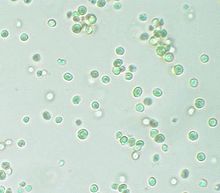Eustigmatophyte
| Eustigmatophyte | |
|---|---|

| |
| Nannochloropsis sp. | |
| Scientific classification | |
| Clade: | SAR |
| Phylum: | Ochrophyta |
| Class: | Eustigmatophyceae Hibberd & Leedale, 1971 |
| Order | |
| |

Eustigmatophytes are a small group (17 genera; ~107 species) of eukaryotic algae that includes marine, freshwater and soil-living species.[1][2]
All eustigmatophytes are unicellular, with coccoid cells and polysaccharide cell walls. Eustigmatophytes contain one or more yellow-green chloroplasts, which contain chlorophyll a and the accessory pigments violaxanthin and β-carotene. Eustigmatophyte zoids (gametes) possess a single or pair of flagella, originating from the apex of the cell. Unlike other heterokontophytes, eustigmatophyte zoids do not have typical photoreceptive organelles (or eyespots); instead an orange-red eyespot outside a chloroplast is located at the anterior end of the zoid.
Ecologically, eustigmatophytes occur as photosynthetic autotrophs across a range of systems. Most eustigmatophyte genera live in freshwater or in soil, although Nannochloropsis contains marine species of picophytoplankton (2–4 μm).
The class was erected to include some algae previously classified in the Xanthophyceae.[3]
Classification[]
- Class Eustigmatophyceae Hibberd & Leedale 1970
- Order Eustigmatales Hibberd 1981
- Genus Fawley, Nemcová, & Fawley 2019
- Family Hibberd 1981 [Chlorobothryaceae Pascher 1925; Pseudocharaciopsidaceae Lee & Bold ex Hibberd 1981]
- Genus ? Pascher 1937
- Genus Chlorobotrys Bohlin 1901
- Genus Hibberd 1981
- Genus Lee & Bold 1973
- Genus Chodat 1921
- Genus Pascher 1938
- Family Hibberd 1981 [Loboceae Hegewald 2007[4]]
- Genus Fawley, Jameson & Fawley 2015
- Genus Hibberd 1981
- Genus Nannochloropsis Hibberd 1981
- Genus Hegewald & Padisák 2007
- Family Amaral et al. 2020
- Genus ? Preisig & Wilhelm 1989
- Genus Amaral et al. 2020
- Genus Munda Amaral et al. 2020
- Genus Amaral et al. 2020
- Genus Neustupa & Nemková 2001
- Order Fawley, Elias & Fawley 2013
- Family
- Genus Goniochloris Geitler 1928
- Genus Chodat 1921
- Genus Pascher 1930
- Genus H.Ettl 1964
- Genus Nakayama et al. 2015
- Family
- Order Eustigmatales Hibberd 1981
Phylogeny[]
Phylogeny of Eustigmatophyceae based on the work of Amaral et al 2020[5]
| ||||||||||||||||||||||||||||||||||||||||||||||||||||||||||||||||||||||||||||||||||||||||||||||||||||||||||
References[]
- ^ Hoek, C. van den; Mann, D.G.; Jahns, H.M. (1995). Algae : An introduction to phycology. Cambridge University Press. ISBN 978-0521316873.
- ^ Guiry, M.D.; Guiry, G.M. (2016). "Eustigmatales". AlgaeBase. National University of Ireland, Galway.
- ^ Hoek, Mann & Jahns 1995, p. 131
- ^ Hegewald, E.; Padisák, J.; Friedl, T. (2007). "Pseudotetraëdriella kamillae: taxonomy and ecology of a new member of the algal class Eustigmatophyceae (Stramenopiles)". Hydrobiologia. 586 (1): 107–116. doi:10.1007/s10750-006-0566-5. S2CID 37483551.
- ^ Amaral, R.; Fawley, K.P.; Němcová, Y.; Ševčíková, T.; Lukešová, A.; Fawley, M.W.; Santos, L.M.A.; Eliáš, M. (2020). "Toward Modern Classification of Eustigmatophytes, Including the Description of Neomonodaceae Fam. Nov. and Three New Genera". Journal of Phycology. 56 (3): 630–648. doi:10.1111/jpy.12980. PMC 7987219. PMID 32068883.
- Ochrophyta
- Heterokont classes
- Algae classes
- Heterokont stubs
